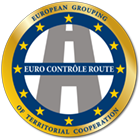A look back at the ADR Expert Class (transport of dangerous goods) in Osnabruck
The programme was developed by France, Germany and the Netherlands which led to an intensive but good week for the participants.
Presentations
The event was opened by BAG vice-president, Robert Maiworm and ECR General Delegate, Gerard Schipper.
After which the programme continued in earnest with a presentation on CLP (Classification, Labeling and Packaging) legislation.An important subject as it intersects with the classification of dangerous goods that have to be enforced during roadside checks on ADR transport. For the participants this subject was a real eye opener, because internationally there seems to be little enforcement of this aspect. Similarly eye opening was the presentation and casework on MSDS (Material Safety Data Sheets). While the topic in itself was better known, again the enforcement side internationally is underdeveloped.
Another subject was the transport of dangerous waste. The topic was shown to be complex. The international legislation on dangerous good transport does not translate to the day to day practice of transport undertakings and enforcers. Complicating enforcement of this kind of transport.
Quiz and cases
As was the case last year participants were given a 40 question multiple choice quiz. Participants could use their reference book during the quiz. Still it proved challenging which was reflected in the scores. The fault margin ranging from 6 to 19.
Proof that a refresher is never superfluous.
An important part of the programme was devoted to working on individual cases. Due to time constraints not all cases could be dealt with but the exercise yielded interesting discussions and a practical exchange of best practice and control practices.
Changes of control directive 95/50/EG and training of enforcement staff.
A presentation of the outcome of a previously executed questionnaire on training of enforcement staff showed that there are considerable differences with regard to training.
Another conclusion was that in some member staff lack competences/powers to conduct an ADR inspection thoroughly.
A desired outcome would be that the EU legislation looks into setting minimum training requirements for enforcement staff carrying out ADR checks.
There was also time to present the ongoing work of the ECR ADR working group to update and harmonize annex I and annex II of the 95/50/EG with other EU legislation, as there are currently some discrepancies.
ECR hopes in time to introduce a proposal for either a modified control directive or a modification of the ADR legislation to bring the two in line.
In closing
The participants were enthusiastic about the week and unanimous in their conclusion that these initiatives contribute not only to the improvement of enforcement skills, but improve international cooperation by bringing into contact the enforcement staff from across the EU.
In line with this objective the decision was taken to hold an international cross border check on ADR transport. Germany, France the Netherlands and Belgium have already taken the first steps. The check will take place in November and will be held under the ECR banner.
The ADR expert class will definitely be back next year!
28/07/2017 - 09:48
